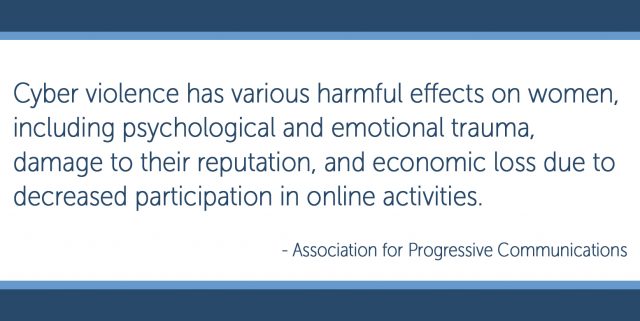
We live in the era of information and communication technologies (ICTs), which allow people around the world to connect, network, and exchange ideas in a way that was not possible before. This opens endless opportunities for communication, as well new dangers and challenges. Just like in the real world, the internet can be unsafe for women and young girls. Cyber violence against women and girls (cyber VAWG) is a fairly new phenomenon that is becoming more and more pervasive. It can take a variety of forms, including sending aggressive or threatening emails, text messages, or instant messages; sharing personal photos and videos without consent; internet trolling; hacking; cyberstalking; and others.
The number of ICT users is growing rapidly every year with the spread of technology, making it critical to start educating societies now about the dangers of cyber-VAWG, advocating for policy reforms to create an open and inclusive internet, and holding the ICT industry accountable to cyber-VAWG’s harmful impact.
In the United States, both men and women are harassed online; however, 57% of adults who reported online harassment are women, compared to 43% of men. In developing countries, security threats and harassment are among the top five barriers to women’s mobile phone ownership. The Association for Progressive Communications explores the impact that cyber-VAWG can have on women, including psychological and emotional trauma, damage to their reputation, and economic loss due to decreased participation in online activities. For example, many women entrepreneurs live in remote rural areas, where access to financing is restricted by the distance they have to travel to banks. In this case, mobile banking helps women expand their businesses and operate them from their homes, where they can still care for their families and children. In addition, the use of mobile technology provides women with market information, management, technology, and networking opportunities.

Women’s reluctance to report online violence causes additional damage to economies and societies at large, perpetuating a culture of impunity and weak legal and social control of online violence. This can be caused by societal and cultural norms and beliefs, mistrust in judicial systems, or simply by lack of knowledge of their rights. According to a study in India, women do not consider cyber attacks on social media or through mobile devices to be “violent,” therefore preferring to ignore or block their harassers rather than reporting the incident. Additionally, they choose to minimize their online presence, which hurts digital inclusion, freedom of speech, and other human rights valued in democratic societies.
Besides the obvious damage that cyber-VAWG causes women and girls, the legal system does not have the full capacity to address this issue. According to a UN Women report, only 26% of law enforcement agencies in 86 countries surveyed take legal measures to combat online violence. One in five women who use the internet live in countries where cyber-VAWG cases are left unsolved. Moreover, social media platforms like Facebook and Twitter have to walk a delicate line in permitting freedom of speech and protecting other human rights. In most cases, social networks shut down the accounts of cyber-VAWG perpetrators, or update their companies’ privacy policies and legal rules. However, the responses to cyber-VAWG still have to be improved to address the entire spectrum of negative effects on women.
What can be done to effectively combat cyber violence against women and girls?
A UN Women report suggests starting by challenging social norms and attitudes, increasing the monitoring and control over ICTs, and finally, updating laws and regulations to include ICTs. As a member of a UN forum on internet governance, CIPE aims to empower citizens to know how their rights to speech, assembly, and association apply in a digital environment.
Together with National Democratic Institute (NDI) and Center for International Media Assistance (CIMA), CIPE recently launched an initiative to curtail harmful digital practices that undermine open internet policies. The groups designed A Democratic Framework to Interpret Open Internet Principles to guide open internet activists to connect and exchange best practices. The framework can serve as an advocacy tool for organizations to utilize in encouraging governments, the private sector, and civil society to adhere to universal human rights through open internet principles and standards. Female public professionals such as journalists, activists, and politicians comprise one of the three categories of women most likely to experience cyber-VAWG. The Personal Safety and Security principle of the Democratic Framework addresses this problem and provides insight on possible policy actions, including advocacy and increased protection of gender equality in political participation.
Sholpan Kassenova is the women’s economic empowerment intern with CIPE’s Women’s Entrepreneurship Staff Forum (WESF).
More Information:
Read about how CIPE is working to close the gender gap and reduce barriers women entrepreneurs face when starting businesses.
Learn about why a new global consortium is taking a holistic approach to empowering women and girls.
CIPE and experts explored the transformative effect of women’s economic empowerment on policy and politics, as well as activities in the digital world, during this recent event.
Published Date: April 12, 2018